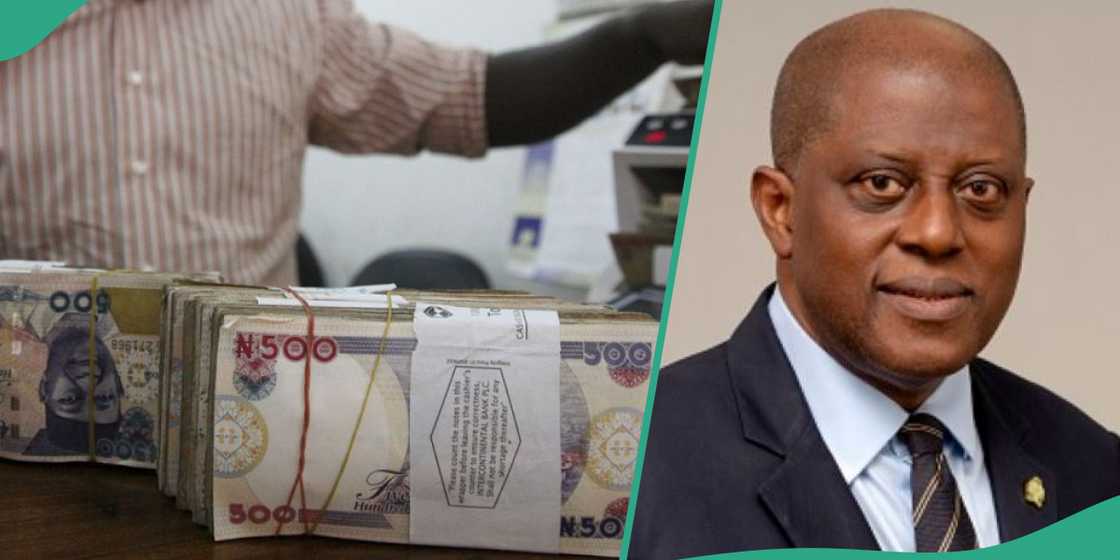Naira Settles at Lowest in 4 Months as CBN Sells Dollar at New Price, Becomes Second-Worst Globally
- Despite the central bank's efforts to maintain it, the value of the naira has fallen to a four-month low
- On Monday and Tuesday, the CBN offered foreign currency at a fixed exchange rate for sale to 29 dealer banks
- Experts stated that reining in recent exchange rate pressures requires increased efforts to remove excess liquidity
Legit.ng journalist Zainab Iwayemi has over 3-year-experience covering the Economy, Technology, and Capital Market.
The naira has plummeted to a four-month low, despite efforts by the central bank to support it, such as raising interest rates for a record 12 meetings this week.

Source: UGC
Bloomberg reported that the foreign currency market's liquidity fell by 23% to $131 million on Thursday, which led to the naira falling to 1,603.8 to the dollar, its lowest level since March 14.
In recent days, the Central Bank of Nigeria has sold dollars to boost local liquidity on many occasions, according to dealers. The bank raised rates by 50 basis points to 26.75% on Tuesday.
The Abuja-based bank said in a statement on its website that the CBN supplied foreign currency to 29 dealer banks on Monday and Tuesday at an exchange rate of 1,470–1,510 naira per dollar.
In order for the naira to stabilize and gain market trust, sales must remain steady, according to an email from Samir Gadio, head of Africa strategy at Standard Chartered Plc in London.
Despite an increase in gross reserves to $37.05 billion as of July 18 from $34.70 billion at the end of June, central bank data indicates that dollars have been harder to come by on the internal Nigerian market.

Read also
Expert speaks on CBN’s decision to raise interest rate by 50 basis points, asks important questions
Patrick Curran, a senior economist at Tellimer Ltd., said in a client note, “The fundamental issue continues to be a persistent lack of FX supply. Without a significant and sustained increase in FX supply, sustained currency appreciation will remain elusive.”
Officials have blamed seasonal demand for dollars as wealthy Nigerians go on holiday overseas and pay foreign school fees.
Naira worse currency
The naira is down 43% this year, making it the second-worst-performing currency tracked by Bloomberg globally after the Lebanese pound. It has lost around 70% of its value since President Bola Tinubu relaxed currency restrictions to attract foreign investment, alongside partially lifting fuel subsidies.
Due to the actions, inflation has accelerated to almost a three-decade high, forcing the central bank to increase borrowing prices by a total of 15.25 percentage points since the beginning of 2022.
The central bank also expanded its "asymmetric corridor" during the meeting, increasing the cost of borrowing for lenders to 500 basis points above the policy rate and lowering the return on their deposits to 100 basis points below the benchmark. In response, it offered a record yield of 22.1% on Wednesday during a Treasury Bill auction.
Curran said that increased efforts to mop up excess liquidity in the banking system is essential to rein in recent exchange rate pressures.
On how to improve the local currency against foreign currencies, Charles Abuede, a financial analyst said,
"What will be great is to ensure improved liquidity in the official market, bridging the arbitrage caused by the disparity between the official and the parallel market, and nip the impact of FX shocks on prices in the bud."
IMTOs receive highest dollar inflow in 6 years
Legit.ng reported that the amount of dollars coming into Nigeria through International Money Transfer Operators (IMTOs) increased to a level not seen in at least six years due to recent changes implemented by the Central Bank of Nigeria (CBN).
A BusinessDay analysis of data from the CBN's most recent quarterly statistical bulletin revealed that dollar inflows rose 39% in the first three months of this year, from $771 million in 2023 to $1.07 billion.
Experts assert that this situation lessens the challenges with foreign exchange liquidity for the most populous nation in Africa because foreign dollar inflows—basically, large-scale remittances from the diaspora—are a substantial source of foreign cash.
PAY ATTENTION: Stay Informed and follow us on Google News!
Source: Legit.ng





